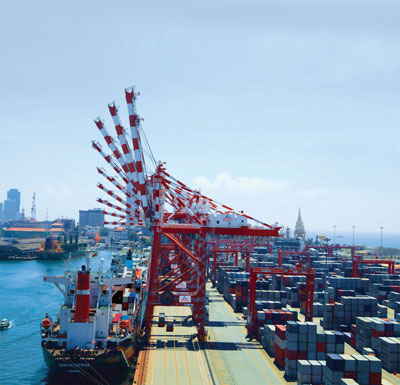Sri Lanka turns to deregulation amidst sliding growth prospects
The new administration is planning an overhaul and deregulation as one of the solutions for the country’s current economic crisis triggered by COVID -19 while improving troubled growth prospects, official sources divulged..
The President has appointed an 18-member “Deregulation Commission” co-headed by senior presidential advisor Lalith Weeratunga and John Keells Chairman Krishan Balendra to fulfil the relevant tasks in 90 days.

File picture of a Colombo Port terminal. Regulation at the ports will be among the many tasks of this commission.
While the commission is still to start its sessions and entertain public representations, it has been receiving representations from civil society activists and organisations, official sources confirmed.
The commission has been given the task of reviewing all laws, regulations and circular instructions pertaining to Government finance, revenue laws and circular instructions, licensing and permit arrangements, investments, approvals and building permits etc.
It will inquire into how those regulations and circular instructions have evolved and circumstances influencing such regulations before presenting their recommendations and other connected matters.
One of the aims of the plan is to dismantle the long-standing regulatory system of the economy which was burdened even before the pandemic and now contracted to a very low level affecting the poor and the middle class, political and public interest activists alleged.
The very first submissions on deregulation and its relevance to Sri Lanka has been made by Archt. Nalaka C. Jayaweera, a leading public interest activist who served as a member of several presidential and government committees including MCC Review Committee and National Trade Policy Committee.
This was followed by the Ceylon Chamber of Commerce calling its members to submit their views proposals and suggestions on deregulation on January19 to make a comprehensive submission to this Commission with its proposals.
In his representations to the President and members of the commission, Mr. Jayaweera has proposed to reconstitute and change the mandate to a permanent Commission with a wide range of technical experts and with public participation.
He stressed the need to have a “Laws & Regulations Development & Synchronising Commission (LRDSC),” as “deregulations” used in the ultra-neoliberal economic theories and practices were meant to destabilise the countries by “mere deregulation” and not allowing the “National Regulatory Mechanisms”.
LRDSC can be made as a permanent body to continue its activities including the modernising of and formulating of laws and regulations as and when it is necessary in the future as well, he added.
Mr. Jayaweera told the Business Times that Sri Lanka lacks laws and regulations to de-regularise as the country’s legal and regulative system have not developed to the minimum when compared with other competitive countries.
In his submissions he stressed the need of “strengthening” the legal and regulative frameworks with much “teeth”, but not “deregulation”.



